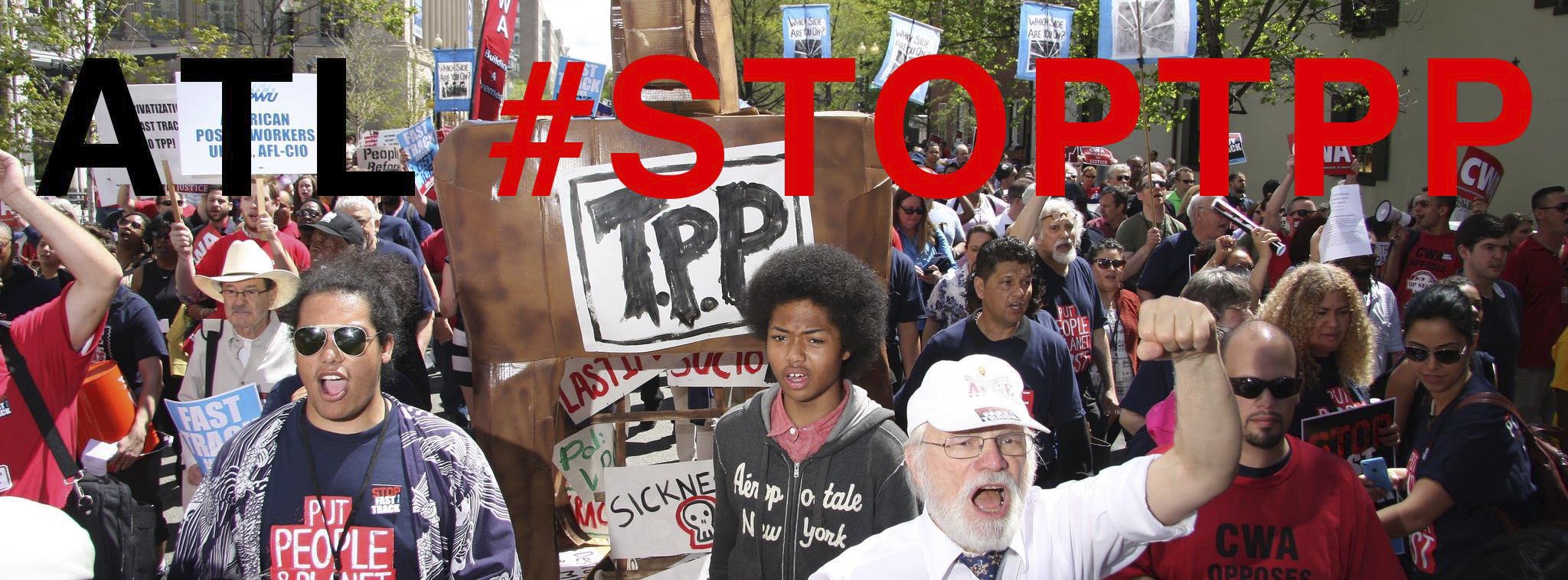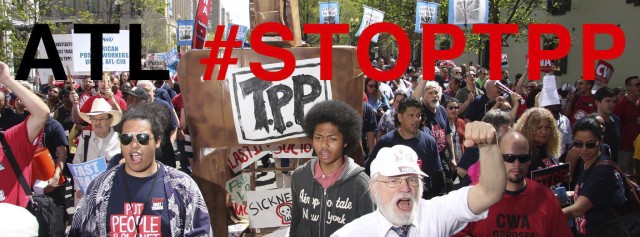



Although described as a trade deal, only a minority of the proposed agreements deal with tariffs and export-import quotas. Opponents denounce the dominant influence of transnational corporations to undermine labor and environmental protections, sabotage the economies of lesser-developed countries, and threaten democratic governance and national sovereignty.
The TPP is also seen as a move by the U.S., in particular, to contain the economic and political growth of China.
The trade ministers from the U.S., Japan, Canada, Mexico, Australia, New Zealand, Vietnam, Malaysia, Singapore, Brunei, Peru and Chile hunkered down in the Westin Peachtree Plaza Hotel in downtown Atlanta on Sept. 30.
The rosy prediction was that the deal would be signed on Oct. 1, but tense disagreements on several issues in the 30 chapter agreement, especially over drug and dairy regulations, kept extending the negotiating sessions for more days.
Although the talks are held in secret, the chief obstacle was reported to be U.S. insistence on a 12-year monopoly for the pharmaceutical industry on biologic, life-saving drugs that treat HIV-AIDS, cancer and other deadly diseases. Lower-cost generic drugs would be denied to the populations of the TPP in favor of high profits for a handful of pharmaceutical companies.
With countries threatening to leave the talks, on Oct. 5, major U.S. media announced that a compromise had been reached midmorning.
Exactly what is contained in the 30 chapters of the agreement is not known. Largely the product of thousands of corporate lobbyists, the public has been denied access to the negotiations.
Based on other trade agreements, such as the North American Free Trade Agreement, opposition has come from a wide variety of organizations and civil society in the affected countries, including organized labor and advocates for the environment, food safety, health, victims of human trafficking and other social justice issues.
The agreement covers 40 percent of the world’s economic output and will continue to be struggled over in each of the 12 countries, as the debate now goes to their elected officials for approval.
Anti-TPP demonstrations
Despite very short notice of the scheduling of the Atlanta meeting, protests were organized to both educate the public about the dangers of the TPP and to challenge the power of the corporate interests in the negotiations.
To that end, from Sept. 30 through Oct. 4, multiple press conferences, marches and rallies took place with demonstrators taking to Peachtree Street and blocking entrances to the hotel.
Several direct actions occurred with protesters gaining access to areas adjacent to the TPP meeting rooms despite strong security. On three separate occasions, Atlanta police were called in to arrest activists who directly confronted negotiators.
In a dramatic move on Sept. 30, Zahara Heckscher, a cancer survivor, brought her IV stand that provides her with life-saving drugs into the meeting and addressed the delegates, appealing to them to fight for unfettered access to biologics for the people of their countries. She was the first of four people to be arrested in three separate people’s interventions.
Large “#Stop TPP” banners were visible from the windows on the floor reserved for the talks, hanging from adjacent parking garages. Similar banners and small signs managed to be placed inside the hotel. Chanting protesters popped up in various locations, anti-TPP leaflets were tossed from balconies and at night, and “Stop TPP” messages were beamed onto the hotel’s exterior.
Raposo is a Portuguese Marxist analyst, editor of the web magazine jornalmudardevida.net, where this article…
By Alireza Salehi The following commentary first appeared on the Iranian-based Press TV at tinyurl.com/53hdhskk.…
This is Part Two of a series based on a talk given at a national…
Educators for Palestine released the following news release on July 19, 2025. Washington, D.C. Educators…
On July 17, a court in France ordered the release of Georges Abdallah, a Lebanese…
The following are highlights from a speech given by Yemen’s Ansarallah Commander Sayyed Abdul-Malik Badr…